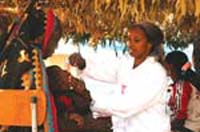The Health Belief Model
The Health Belief Model (HBM) is a model at the individual level that has been used to explain change and maintenance of health-related behaviours. You will be able to use it as a guiding framework for your health education work, especially during any health behaviour interventions.
The Health Belief Model has four major concepts. It assumes that people will take action to prevent or to control ill-health if they regard themselves as susceptible to the condition (perceived susceptibility). Also they will take action if they believe that the condition will have potentially serious consequences for them (perceived severity), and if they believe that the course of action available to them is beneficial in reducing their susceptibility to, or severity of, the condition (perceived benefits). They also need to believe that the anticipated barriers to taking the action are outweighed by its benefits (perceived barriers).
Think of an illness that you have experienced. Now using the questions below analyse your experience in terms of the Health Belief Model:
- Before developing the disease, had you ever thought that you were likely to develop the illness? (perceived susceptibility)
- Had you thought that the disease was severe with possibly serious complications? (perceived severity)
- Had you considered the benefits of getting treatment for the illness? (perceived benefits)
- Had you thought of any problems of accessing treatment for the disease? (perceived barriers)
Because the HBM is so closely based in individual experience it is easy to use it to think about illnesses we have had. Did you find that all four questions were easy to apply to your own experience of illness? Also, because it works so well as a way of thinking about our own experiences, going through the elements of the HBM should help us understand some of the influences on the health beliefs of other people in our community (Figure 5.3).

Before you move on, just check now that you know the assumption and the four major concepts that are central to the HBM?
The HBM assumes that the most important determinants of people's behaviours are their beliefs or perceptions. There are four major concepts related to perceptions and beliefs: perceived susceptibility, perceived severity, perceived benefits and perceived barriers.
Let us consider this now in a practical context. According to the HBM, a young, single individual is most likely to attend for an HIV test if the following applies:
- If they believe that they are likely to get an HIV infection (perceived susceptibility)
- If they believe that HIV is a serious disease (perceived severity)
- If they believe that it is important to know their HIV status and also that this will help them to get other services such as medication (perceived benefits)
- If they also believe that they can get the HIV test for free and there are no major problems to get the test (perceived barriers).
Therefore if you are applying the HBM in designing health education sessions about the importance of HIV testing, your role as a health educator will be to teach people about:
- Their susceptibility to HIV infection
- The serious consequences and severity of HIV/AIDS
- The benefits of getting professional help.
Read the description above again, which sets out the HBM in relation to HIV/AIDS. Now consider the following situation. Assume that you are planning to educate Ato Abebe, a member of your community, on how to prevent malaria using a teaching session based on the Health Belief Model. How you would use the HBM to help you design your health education session?
If you want to apply the Health Belief Model in designing your health education session on preventing malaria, the first step will be to identify Ato Abebe's personal beliefs according to the components and assumptions of the HBM.
You could ask Ato Abebe the following questions that are based on the HBM:
- Do you believe that you are susceptible to get malaria? (perceived susceptibility)
- Do you understand that malaria is a serious disease? (perceived severity)
- Do you think that going to a health centre for the diagnosis and treatment of malaria is important? (perceived benefits)
- Do you know that you can get malaria diagnosed and treated at the health centre? There should be no major problems for you to get the necessary services (perceived barriers).
Based on the answers that you get from Ato Abebe you can develop your health messages as follows:
- You are susceptible to get malaria infection
- Malaria is a serious disease
- Please go to a health centre for tests, and if you are found to have malaria take the medication that will be given to you
- You can get the medication for malaria at reasonable cost.